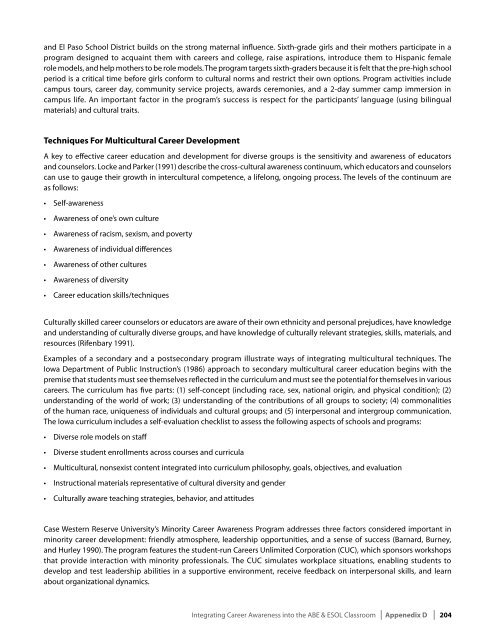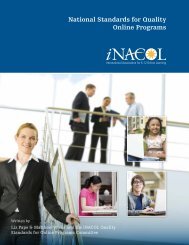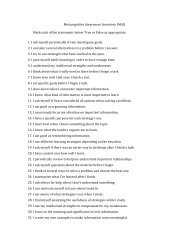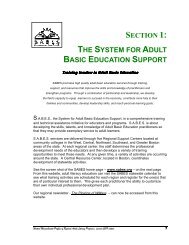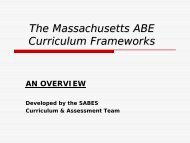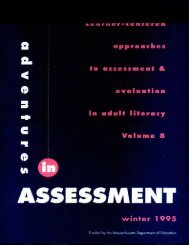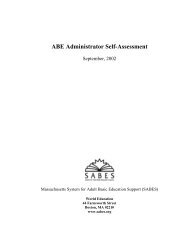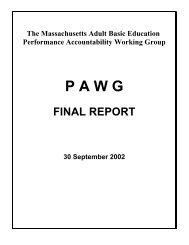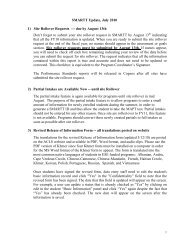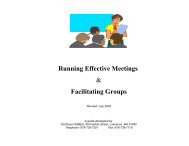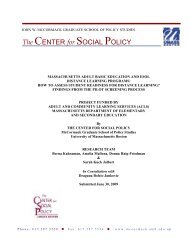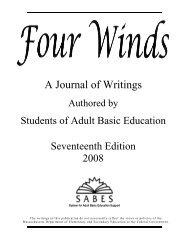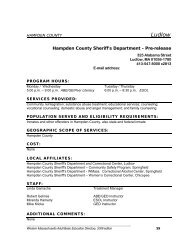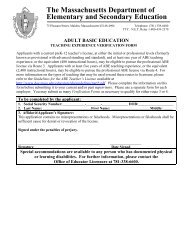Integrating Career Awareness into the ABE/ESOL Classroom - SABES
Integrating Career Awareness into the ABE/ESOL Classroom - SABES
Integrating Career Awareness into the ABE/ESOL Classroom - SABES
- No tags were found...
Create successful ePaper yourself
Turn your PDF publications into a flip-book with our unique Google optimized e-Paper software.
and El Paso School District builds on <strong>the</strong> strong maternal influence. Sixth-grade girls and <strong>the</strong>ir mo<strong>the</strong>rs participate in a<br />
program designed to acquaint <strong>the</strong>m with careers and college, raise aspirations, introduce <strong>the</strong>m to Hispanic female<br />
role models, and help mo<strong>the</strong>rs to be role models. The program targets sixth-graders because it is felt that <strong>the</strong> pre-high school<br />
period is a critical time before girls conform to cultural norms and restrict <strong>the</strong>ir own options. Program activities include<br />
campus tours, career day, community service projects, awards ceremonies, and a 2-day summer camp immersion in<br />
campus life. An important factor in <strong>the</strong> program’s success is respect for <strong>the</strong> participants’ language (using bilingual<br />
materials) and cultural traits.<br />
Techniques For Multicultural <strong>Career</strong> Development<br />
A key to effective career education and development for diverse groups is <strong>the</strong> sensitivity and awareness of educators<br />
and counselors. Locke and Parker (1991) describe <strong>the</strong> cross-cultural awareness continuum, which educators and counselors<br />
can use to gauge <strong>the</strong>ir growth in intercultural competence, a lifelong, ongoing process. The levels of <strong>the</strong> continuum are<br />
as follows:<br />
• Self-awareness<br />
• <strong>Awareness</strong> of one’s own culture<br />
• <strong>Awareness</strong> of racism, sexism, and poverty<br />
• <strong>Awareness</strong> of individual differences<br />
• <strong>Awareness</strong> of o<strong>the</strong>r cultures<br />
• <strong>Awareness</strong> of diversity<br />
• <strong>Career</strong> education skills/techniques<br />
Culturally skilled career counselors or educators are aware of <strong>the</strong>ir own ethnicity and personal prejudices, have knowledge<br />
and understanding of culturally diverse groups, and have knowledge of culturally relevant strategies, skills, materials, and<br />
resources (Rifenbary 1991).<br />
Examples of a secondary and a postsecondary program illustrate ways of integrating multicultural techniques. The<br />
Iowa Department of Public Instruction’s (1986) approach to secondary multicultural career education begins with <strong>the</strong><br />
premise that students must see <strong>the</strong>mselves reflected in <strong>the</strong> curriculum and must see <strong>the</strong> potential for <strong>the</strong>mselves in various<br />
careers. The curriculum has five parts: (1) self-concept (including race, sex, national origin, and physical condition); (2)<br />
understanding of <strong>the</strong> world of work; (3) understanding of <strong>the</strong> contributions of all groups to society; (4) commonalities<br />
of <strong>the</strong> human race, uniqueness of individuals and cultural groups; and (5) interpersonal and intergroup communication.<br />
The Iowa curriculum includes a self-evaluation checklist to assess <strong>the</strong> following aspects of schools and programs:<br />
• Diverse role models on staff<br />
• Diverse student enrollments across courses and curricula<br />
• Multicultural, nonsexist content integrated <strong>into</strong> curriculum philosophy, goals, objectives, and evaluation<br />
• Instructional materials representative of cultural diversity and gender<br />
• Culturally aware teaching strategies, behavior, and attitudes<br />
Case Western Reserve University’s Minority <strong>Career</strong> <strong>Awareness</strong> Program addresses three factors considered important in<br />
minority career development: friendly atmosphere, leadership opportunities, and a sense of success (Barnard, Burney,<br />
and Hurley 1990). The program features <strong>the</strong> student-run <strong>Career</strong>s Unlimited Corporation (CUC), which sponsors workshops<br />
that provide interaction with minority professionals. The CUC simulates workplace situations, enabling students to<br />
develop and test leadership abilities in a supportive environment, receive feedback on interpersonal skills, and learn<br />
about organizational dynamics.<br />
<strong>Integrating</strong> <strong>Career</strong> <strong>Awareness</strong> <strong>into</strong> <strong>the</strong> <strong>ABE</strong> & <strong>ESOL</strong> <strong>Classroom</strong> | Appenedix D | 204


